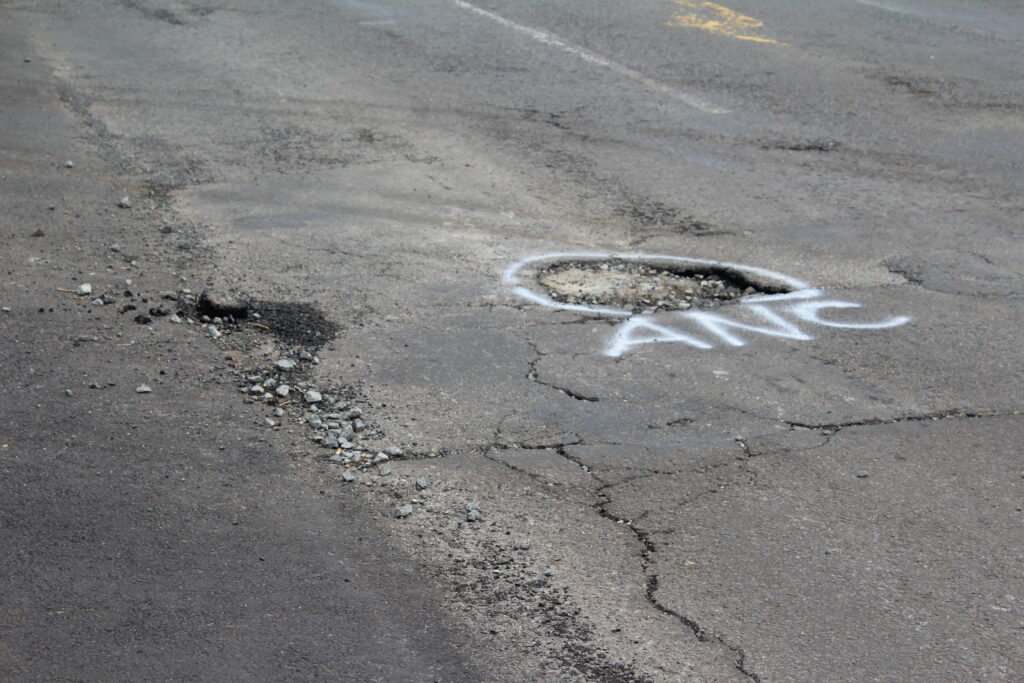
THE photo that accompanies this piece indicates that whatever their level of current despair, South Africans have yet to lose their sense of humour, often the only protection against absurdity. A number of potholes in our neighbourhood were recently decorated like this, succinctly summing up the vast dislocation between government and people. They were filled in and their graffiti erased surprisingly quickly. Humour is not a strong point with authoritarians.
While I was writing we were suffering from a double assault on our electricity supply. Eskom was in a permanent state of rolling blackouts ranging at the time from level four to six. But we were also subject to municipal load reduction, which cut off consumers for four to five hours at a stretch. This was a challenge for the best-organised household and no doubt terminal for some businesses. I was due for a Covid vaccine booster, but the local clinic was inaccessible because of a strike by public servants [sic] that involved violence. Christine was unable to use the public library to borrow books for teaching purposes: it was shut due to lack of water although the local dams are overflowing. The number of post offices in Pietermaritzburg is down to two and only one of them renews motor vehicle licences.
Virtually everything touched by the state, which is indistinguishable from the ANC, has failed or is failing and the national economy is now in recession. South Africa’s leading cartoonist responded to the recent Cabinet reshuffle by showing the president on the Titanic saying ‘Well, we’ve added one more person and two deckchairs’. The person was a new minister within the presidency responsible for electricity supply, already being called the minister for loadshedding.
Yet life carries on somehow and South Africans at all socio-economic levels get on with it, avoiding any sort of government if they can. How is this possible? As a child of the post-war British welfare state, it pains me to say this but it’s possible because of private enterprise. A recent commentary pointed out that through all of the country’s recent troubles, including a regional and very violent insurrection, commerce and industry managed remarkably well. The shops and petrol stations rarely failed their customers. The state constantly fails as the number of service delivery protests bears witness. (They admittedly have complex causes beyond simple delivery, but some of those are entirely of the ANC’s own making.)
Because the ANC is now more mafia than political party, and one that has penetrated most of the components of the justice system, it is hard to see how South Africa can recover without a hefty measure of privatisation. Electricity generation and supply would be a good place to start. Given the rigid ideology that governs the ANC a more flexible approach to the commanding heights of the state is hard to imagine. But at other levels it has already begun; and in our case at our garden gate.
Waste recycling is recognised by every responsible person as imperative for a variety of environmental reasons. Not many people take it to the extreme level of a man (in Cornwall, I think) a few years ago who recycled so much waste that his only contribution to the local landfill site for the entire year took one standard garbage bag. The contents of the rubbish bags in our neighbourhood suggest that a large proportion of households have no clue about the importance of recycling but an interesting symbiotic, and efficient, relationship has developed based on very basic private enterprise.
Ideally the municipality should take charge of recycling, setting down rules and creating job opportunities. But the dead hand of the ANC prevents this, so what it fondly refers to endlessly and hypocritically as ‘our people’ have taken the initiative. Every Monday morning scores of waste pickers and recyclers from local informal settlements descend on our streets with large sacks and disaggregate the household rubbish looking for recyclable material to sell. The sacks become so heavy that many of these entrepreneurs have built go-kart type vehicles or liberated supermarket trolleys to assist their work. The latest trend is to attach number plates that have presumably fallen off registered vehicles. Some of these recycling transporters appear to have travelled from as far away as Kloof or Durban. It’s an ironic touch.
We have an arrangement with three regulars who take all our plastic, tins and cardboard (heavier material such as glass goes to the next level of entrepreneur who owns a bakkie). This experience has reduced my residual socialist leanings. If the municipality were running a recycling operation it would soon collapse in corruption and inefficiency. Nor would it gain the co-operation of householders. But this way they can continue with their slothful, negligent behaviour while collectors displaying zeal and efficiency born of necessity do their sorting for them and eke out a marginal but independent livelihood.
The current scandal around the escape from Mangaung prison of the Facebook rapist, Thabo Bester, has ignited indignation about the fact that it is run by a private, British-based multinational company. Full-frontal outrage is on display, but the reason for this privatisation is simple: an opportunity for kickbacks and massive looting by ANC members. Gavin Watson’s Bosasa was simply a domestic version of the same syndrome. The Tripartite Alliance commitment to nationalisation is a sham that holds good only until there is a better opportunity for graft.
For a movement so opposed to privatisation, it has done a remarkably thorough job of diverting public funds into private hands.